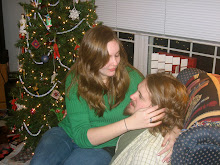After an attempt to write my contribution, if I had been a member of the party imortilized by Plato, I found some other neat things about the Symposium. First, something I found humerous. The "Very Squashed" version of the Symposium:
"We were all a bit drunk at Agathon's house, and decided to talk about Love.Phaedrus said: Not birth, nor wealth, nor honours, nor aught else shall so inspire a man as Love. There is none so base but that Love may breathe into him the spirit of a hero. Therefore I say that, of all the gods, Love is the eldest and the most to be honoured.Pausanias said: There is more than one Love. Vulgar love is worthless, inconsistent and fleeting; but the love of the virtuous character abides throughout life.Aristophanes said: I have a theory that the gods split us in halves, and each each of us is always looking for his other half. Some seek the opposite sex to love, some seek the same (men who seek men are especially valiant and fine) but all are really craving to become one, soul and body.Agathon: These are loves gifts, but the God of Love himself is the youngest and the swiftest, since he outstrips in flight old age. Said Socrates: Is Love of something lacking? The prophetess Diotima told me that Love is not a mortal, nor a god. Love, in reality is of every good, not of just missing things or desired things.Aristodemus fell asleep, and woke to find Socrates, Aristophanes and Agathon still talking and drinking."
The very intricate nature of the Symposium, stories weaved into stories, is examined further at this site, while an in-depth analysis of Socrates' response when his turn came around (which it seemed a few people I talked to liked, thus I searched for this in particular) can be discovered here. I was particularly struck by "Plato's Symposium reveals love, like wisdom, to be a dynamic, a flow of energy that operates throughout all the levels of human awareness, uniting and transcending or fragmenting and descending as it flows. There are latent possibilities in different kinds of love to either pull us up to Socrates' unified and ultimate good in the world of Being, or to pull us down into a dense, fragmented experience of the forms. When Diotema asks Socrates what is it that one desires when one loves, the answer is immortality, union with the eternal, and though we see divinity in all of life, it is contained in various forms which can often corrupt of distort it, as well as accurately reflect it."
And, finally, Aristophanes. I mentioned before that his was my favorite answer of the bunch. The beauty inherent in finding your other half, the other piece to make you whole, is simply awe-isnpiring. It is a beautiful idea, and feels more truthful than any of the rest to me. Love is all about finding your other half, and joining the two fragments to make the whole that is more than the sum of its parts.
4 years ago

No comments:
Post a Comment